 (1.1)
(1.1) I've decided after good example to write some diary pages with toughts and events.
Oh, in case anybody fails to understand, I'd like to remind them that these pages are copyrighted, and that everything found here may not be redistributed in any other way then over this direct link without my prior consent. That includes family, christianity, and other cheats. The simple reason is that it may well be that some people have been ill informed because they've spread illegal 'copies' of my materials even with modifications. Apart from my moral judgement, that is illegal, and will be treated as such by me. Make as many references to these pages as you like, make hardcopies, but only of the whole page, including the html-references, and without changing a iota or tittel...
And if not? I won't hesitate to use legal means to correct wrong that may be done otherwise. And I am serious. I usually am. I'm not sure I could get 'attempt to grave emotional assault' out of it, but infrigement on copyright rules is serious enough. And Jesus called upon us to respect the authorities of state, so christians would of course never do such a thing. Lying, imagine that.
Previous Diary Entries
| List
of Diary Pages | Home Page
I think for the time being I'll leave the previous diary page as it
is, though it is unfinishe, because it will take more work and thinking ,
and I got lots more to write and present. The bottom of this page is from
last week, this section is the most recent, with pictures, scans, opinions
and facts. What am I, a news station? Nope, I guess I'd bettter be a radio
pirate, but then as I knew aout when I was a real small (low transmitter
power) one, long ago, in highschool. I'd have my set of cassette decks
and player, my amp and speakers, mike and mixer, and occasionally a record
player and pre-amp, and even a tape deck (two of those reel to reel Sonys,
with multitrack facilities, too noisy and mine too wow and flutterish to
be realy up to my hifi standards , but smooth over-0db recording behaviour
and at 19.5 cm tape eating speed good enough frequency characteristics and
prossibly dymanics), I'd feed back my transmitter signal in counter
phase through a good enough quality tuner into a mixer channel to get excellent
enough audio quality, and would transmit more than good enough stuff, sometimes
with full duplex link with a friend of mine who I built another of the little
transmitters.
Major fun, and when I look at public broadcasters, there is room for quite
some more decent music and good stuff on the air, if mankind deserves it.
I've got a copy around of a 'rage against the machine', I think it
was their first or most well known CD, with 'Fuck you, I won't do as you
tell me' on it which I can play, that's decent indecent material, at least
that speaks of being holy from the great whore, and meaning it not to want
to be in the life of one of her oppressors games. (reagan voice on) 'Weeeeellllll
mister verelst, lets see what the costs are of you being wonderfully motherfucked
into our great nation', oh no, that isn't right, it would be like, 'Well
theo, that is some mighty fine software you wrote. Did you implement the,
well, eh mark in it as well?'. .. Me in happy electrical engineer
student (fake) mode, 'Huh? What do you mean exactly, mister president, I'm
not sure I'm advanced enough in all that'.
'Burn, burn, you're gonna burn', meaning in decent christian languages
that certain buildings in the social or spiritual might be not built of
materials that are insensitive to a uncarefully thrown away match, and that
what happened to cities with the plague in the middle ages could in that
comparison happen with the certain peoples lives or part of it, and even
of great systems which 50 years later are still in the end completely unsuccessfull.
Christal chappel is still there, so is the great whore ma'm with its seat
in Rome.
SECOND QUANTIZATION AND COHERENT STATES
The quantum mechanics of a single particle
is usually formulated in terms of the position operator x and the
momentum operator p. All other operators of physical interest may be
expressed in terms of these operators. and a natural representation for quantum
mechanics. the coordinate representation, is defined in terms of eigenfunc-
tions of the position operator. In this chapter. an analogous formalism is
developed for systems composed of many identical particles. For these systems
it is useful to define operators which create or annihilate a particle in
specified states. Operators of physical interest may be expressed in terms
of these creation and annihilation oper- ators, in which case they are said
to be expressed in "second quantized" form. The eigenstates of the annihilation
operators are coherent states. A natural representation for the quantum mechanics
of many-particle systems, the holomorphic representation. is defined in terms
of these coherent states.
As a prelude to the formalism for
many-particle systems. it is useful to begin by reviewing some elementary
aspects of quantum mechanics.
1.1 QUANTUM MECHANICS OF A SINGLE PARTICLE
Quantum mechanics describes the state of a particle by a state vector 14». which belongs to a Hilbert space ){. This Hilbert space ){ is the vector space of complex. square integrable functions. defined in configuration space. Using Dirac notation. the scalar product of vectors in ){ is:
(1.1)
foreach i [glob *.*] {
if {[file type $i] == "file"} {
puts -nonewline "[catch {file rename $i Lc/[string tolower $i]}] " ;
puts $i
}}
then a bash (shell) script to make the small images: in a subdirectory:for i in *.jpg ; doI think I'll make a seperate page with the originals available, with a clickable list of small images, these are at the moment just as they are, they cannot be clicked for the original size, except when noted. I'll put some cations in, though.
djpeg -scale 1/4 -pnm $i |
cjpeg -quality 40 -progressive -outfile Small/$i ;
done
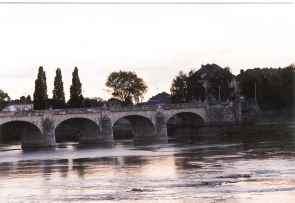

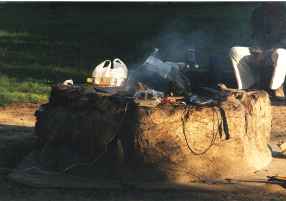

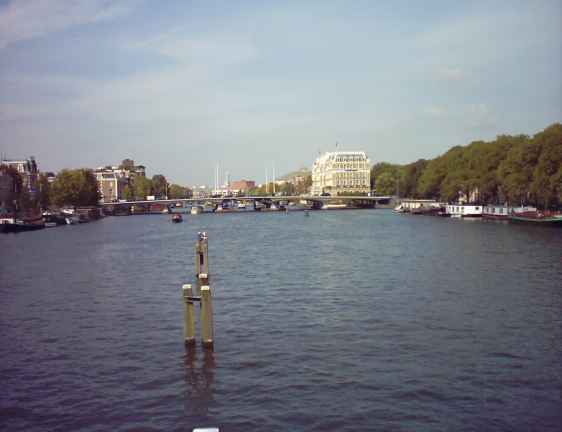 Yes i can make postcards, in fact I with good success made
officially printed art ones print ready, but eh, what does a potential doctor
in top level electrical engineering do with such skills? NOt waste them too
much on the Amstel, I'm sure.
Yes i can make postcards, in fact I with good success made
officially printed art ones print ready, but eh, what does a potential doctor
in top level electrical engineering do with such skills? NOt waste them too
much on the Amstel, I'm sure.

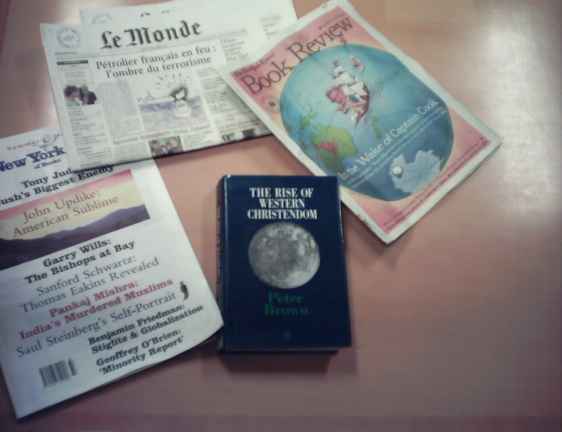 In the PC Hoofthuis library
In the PC Hoofthuis library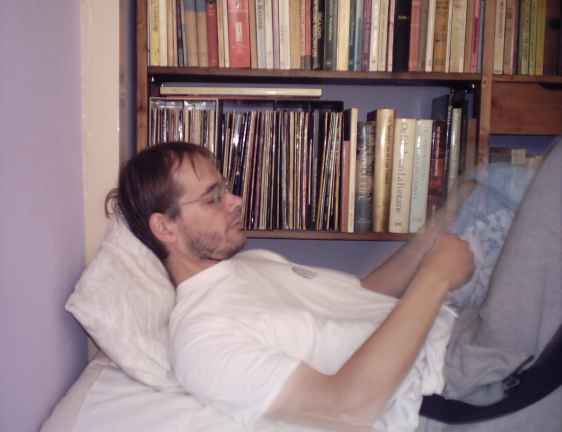 sometimes I'm here, this time unshaven.
sometimes I'm here, this time unshaven.
 Some of the Good Life.
Some of the Good Life.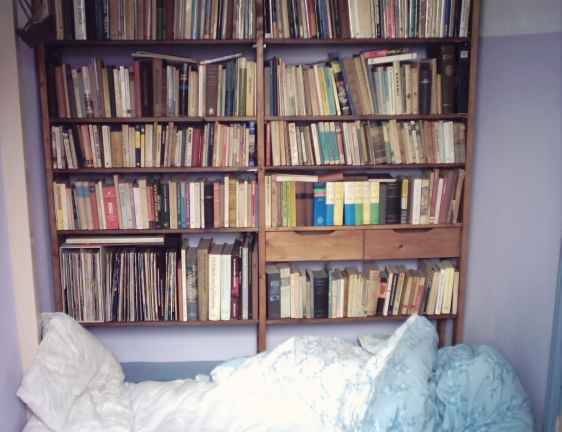

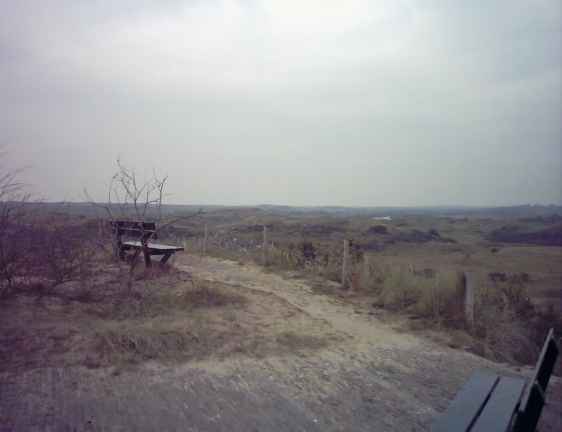
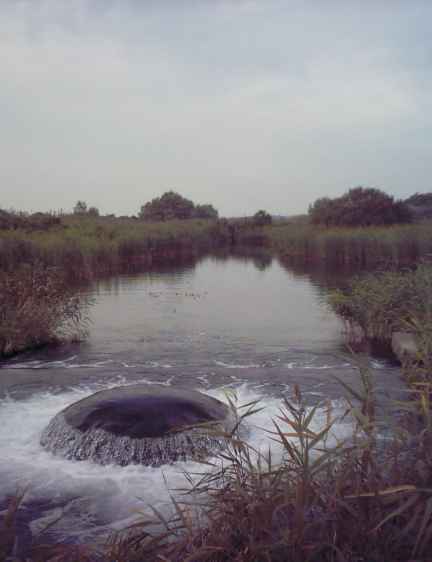
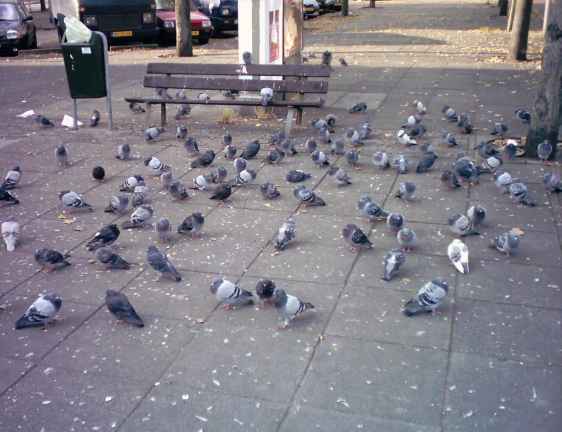

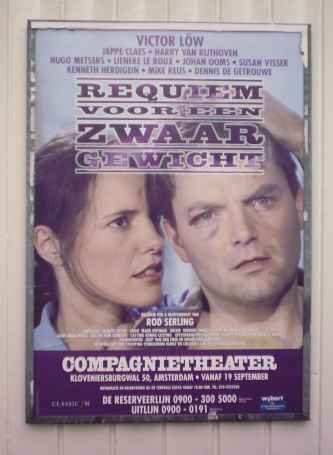

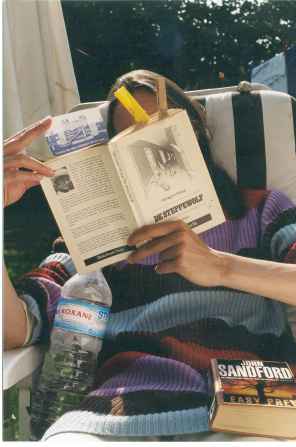
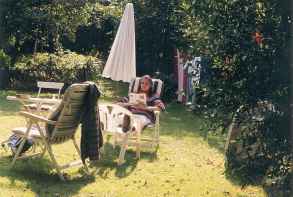
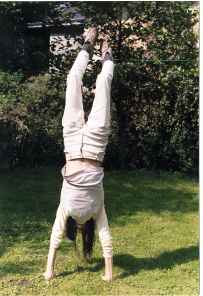
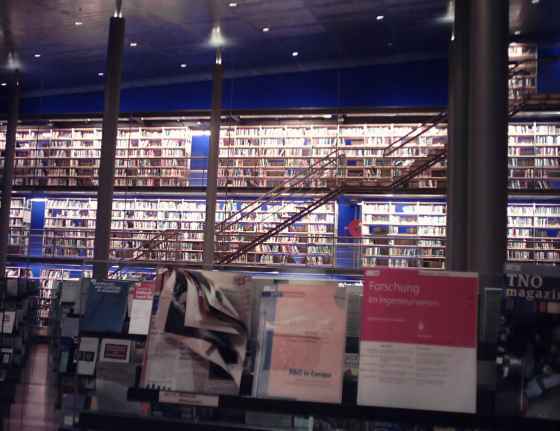 Delft university central library. Hitler greeting didn't work,
luckily. There was no response...
Delft university central library. Hitler greeting didn't work,
luckily. There was no response... 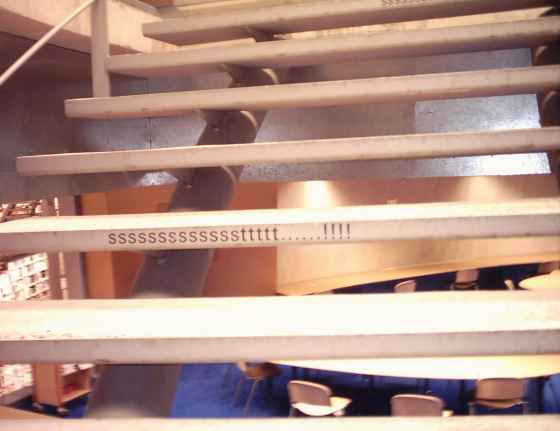
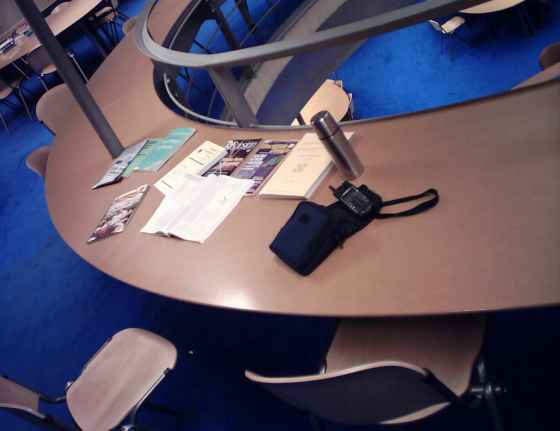
 me as preacher or course leader (the latter I was officially at times),
just testing the suit, the pa system and a camera with some of my last year
diary pages which in the end I was forbidden to print at salvation army headquarter.
Though by on person alone, actually.
me as preacher or course leader (the latter I was officially at times),
just testing the suit, the pa system and a camera with some of my last year
diary pages which in the end I was forbidden to print at salvation army headquarter.
Though by on person alone, actually.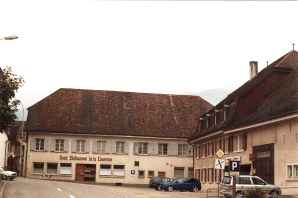 a restaurant in Switserland, Soloturn, it could be I don't realy remember.
No nazi associations sensible, no criminal maffia smell to me, yet rock solid
a building. Though it would look good on picture, but I never visited.
a restaurant in Switserland, Soloturn, it could be I don't realy remember.
No nazi associations sensible, no criminal maffia smell to me, yet rock solid
a building. Though it would look good on picture, but I never visited.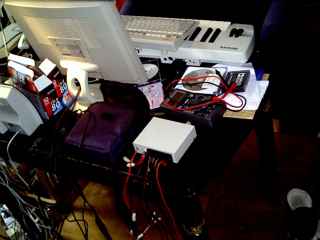 Backside of the small but excellent enough amp and more wires around
a previous setup.
Backside of the small but excellent enough amp and more wires around
a previous setup.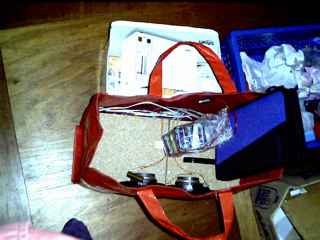 A shopping bag with two speakers, a rechargeable battery pack, and
a book of CD's waiting for the amp to go camping.
A shopping bag with two speakers, a rechargeable battery pack, and
a book of CD's waiting for the amp to go camping.8 Empire and Aftermath: AD 200-500
Constantinople. The eastern Mediterranean, the Black Sea and the western Middle East proved more than sufficient to support a "Roman" empire which found that it could manage very well without Rome. Finally, after AD 640, the Arab conquests joined the regions previously divided between Rome and Persia, so as to form the largest empire ever created in ancient times. Made up of a galaxy of ancient lands, that stretched from Andalusia to Turkestan, the Islamic empire of the Calif Harun al-Rashid (788-803) dwarfed the empire of his contemporary, Charlemagne (768-814), recently established at the northwestern extremity of Eurasia.
Yet, when it came to relations with the "barbarian" world that flanked the settled lands, the fate of western Europe differed significantly from that of North Africa and the Middle East. We must always remember that "barbarian" meant many things to Bardaisan and his contemporaries. It could mean nothing more than a "foreigner," a vaguely troubling, even fascinating, person from a different culture and language-group - by which criterion, Persians and even, to a man such as Bardaisan, Romans, were "barbarians." But "barbarian" in the strong sense of the word meant, in effect, "nomad." Nomads were human groups placed at the very bottom of the scale of civilized life. The desert and the sown were held to stand in a state of immemorial and unresolved antipathy, with the desert always threatening, whenever possible, to dominate and destroy the sown.
In North Africa and the Middle East, of course, the reality was profoundly different from this melodramatic stereotype. For most of the time, pastoralists and peasants lived side by side, in a humdrum and profitable symbiosis. Compared with the solid structures of towns and villages, the nomads were demographically and socially as light as driven dust. They blew in and out of the interstices of the settled world at periodic moments of the year. They were a despised but useful underclass, condemned, by the merciless conditions of the ecological niche that they controlled, to remain as if on another planet, locked into a distinctive culture and life-style. It was assumed that this debris of humanity, though often irritating, could never constitute a permanent threat to the
"The Laws of Countries" 9
great empires of the settled world, much less that it could replace them. The Arab conquests of the seventh century, and the consequent foundation of the Islamic empire, took contemporaries largely by surprise.
This could not be said, however, of the cold plains of the north, that stretched from the puszta of Hungary, across the southern Ukraine, to Central and Inner Asia. Here conditions favored the intermittent rise of aggressive and well-organized nomadic empires. Fast, sturdy horses bred rapidly and with little cost on the thin grass of the steppes. These overabundant creatures, mounted for war, gave to the nomads the terrifying appearance of a nation in arms, endowed with uncanny mobility. One such confederacy penetrated the Caucasus into the valleys of Armenia, in the middle of the fourth century:
no one could number the vastness of the cavalry contingents [so] every man was ordered to carry a stone so as to throw it down ... so as to form a mound ... a fearful sign [left] for the morrow to understand past events. And wherever they passed, they left such markers at every crossroad along their way.
The sight of such cairns was likely to stick in the memory. Unimpressed by the nomads of Arabia and the Sahara, the rulers of the civilized world scanned the nomadic world of the north with anxious attention.
Yet, terrifying though the nomadic empires of the steppes might be, they were an intermittent phenomenon. Effective nomadism depended on the maximum dispersal of families, each maintaining the initiative in maneuvering its flocks towards advantageous pasture, with a minimum of interference from a central authority. To change from herding scattered flocks to herding human beings, through conquest and raiding, under the leadership of a single ruler, was an abnormal and, usually, a shortlived development for most nomads. In any case, even a mighty war-lord such as Attila (434-453) found that his ability to terrorize the inhabitants of the settled land was subject to an automatic "cut off." The further from their native steppes the nomads found themselves, the less access they had to those pastures that
10
Empire and Aftermath: AD 200-500
"The Laws of Countries"
11
provided the vast surplus of horses on which their military superiority depended.
As a result, the nomadic confederacies of the Huns, in the fifth century AD, and of the Avars, in the seventh and eighth centuries AD, tended to settle down, after a few decades of spectacular sabre-rattling. They lay like cold fog-banks on the eastern horizon of Europe. What they brought, in the long run, was not the end of the world, as many feared, but a hint of the immense spaces that lay behind them. They stood for an international world whose vast horizons the great settled empires to their south could barely rival. Garnets from northern Afghanistan, set in intricate gold work that echoed the flying beasts and coiled dragons of Central Asia and China, flowed into the Danubian court of Attila. By the mid-fifth century, such jewelry formed an international "barbarian chic," a sign of high status sported alike by Roman generals and by local kings. Hunting with hawks entered western Europe from Central Asia at this time; and, in the eighth century, the crucial development of stirrups spread to western horsemen as a result of Lombard-Avar contacts in the region between the Danube and Friuli. Up to almost the end of our period, the Avar governor commanding the regions bordering on Vienna still bore a name that was a distant echo of the official title of a Chinese provincial governor.
Yet, in western Europe, the nomad world remained a remote, if imposing, presence. Relations with "barbarians" evolved in a significantly different manner. The juxtaposition of "settled" and "barbarian" regions was charged with great weight for a man of the Near East. It was not appropriate when applied to the Roman frontiers of Britain and the Rhine. The ideology of the settled world made it appear as if a chasm separated the populations contained within the frontiers of the Roman empire from the barbarians gathered outside. Their life was portrayed as incommensurable with that of civilized persons, as if it was the life of the nomads of the steppes and the deserts. But these populations were not nomads. Northwestern Europe had no place for the stark ecological contrast between the desert and the sown that made the settled populations of North Africa and the Middle East feel so different from
their "barbarian" neighbors. Rather, Roman and non-Roman landscapes merged gently into each other, within a single temperate zone.
Despite certain contrasts of terrain, which struck Roman observers, most notably, the somber, primeval forests of Germany, the lands outside the Roman frontiers were inhabited hv peoples who shared with the provincial subjects of the Roman empire, in Britain, Gaul and Spain, the same basic building-blocks of an agrarian society. They, also, were peasants. They, also, struggled to wrest their food from the heavy, treacherous earth, "the mother of men." Their overall population was low. It was more dispersed. They lived in isolated farms and hamlets, cut off from each other by stretches of forbidding forest and moorland. The villages excavated by archaeologists rarely seem to have contained more than three hundred inhabitants. Yet, as in the case of the village excavated at Feddersen Wierde, near Bremerhaven on the north German coast, these could be stable settlements, laid out with care;
large barns and buildings hint at increasing social differentiation over the centuries. Along the North Sea coast of Frisia, bcvond the last Roman garrisons, the inhabitants defended the arable land against the salt-water tides with the same skill and tenacity as did their neighbors across the sea, the nominally "Roman," British peasants of the Fenland. Crucial skills of metal-working were practiced; but such skills were virtually invisible to Roman eyes, taking place as they did in the smithies of tiny villages, unconnected by the over-arching political and commercial structures that enabled the Romans to bring so much metalwork together, with such deadly effect, in the armaments of their legions.
Iivestock played a prominent role among such peoples. It promoted more dispersed patterns of settlement. It was the focus of intense, upper-class competition for mobile wealth, as in the great cattle raids of Irish epic and in the solemn cattle-tributes that expressed the power of chieftains in Germany. Pastoralism on this scale seemed rootless to Romans. It certainly gave greater access to protein, in the form of meat and dairy-products, than was common among the disciplined Imt under-nourished peasants of the Mediterranean. Hence the
12
Empire and Aftermath: AD 200-500
"The Laws of Countries"
13
pervasive sense, among Romans, of the "barbarian" north as a reservoir of mobile and ominously well-fed young warriors. Germans, wrote a doctor in fifth-century Constantinople, eat large quantities of meat. As a result, they have more blood in their veins, and, consequently, are not afraid of losing it: no wonder, he adds, that they make such admirable soldiers! Yet, the moment Germanic villagers and ranchers found themselves confronted by true nomads, such as the Huns, they had no illusion as to which world they belonged: they were agrarian peoples, a northern extension of a peasant economy that stretched, without significant interruption, from the Mediterranean to the southern Ukraine. When the Visigoths of Moldavia and the Ukraine began to be subjected to Hunnish raids, in 374, their first reaction was to seek permission to enter the Roman empire. What has been grossly misnamed as a "barbarian invasion" was, in fact, the controlled immigration of frightened agriculturalists, seeking to mingle with similar farmers south of the border.
The ideology expressed by a writer such as Bardaisan was widespread among educated persons in the Latin- and Greek-speaking worlds. "I expect no more to have Germans among my readers," wrote the famous Greek doctor, Galen of Ephesus, an older contemporary of Bardaisan, "than I would expect to have bears and wolves." Despite such views, no unbridgeable social or ecological chasm stood between the Roman frontiers of Britain, the Rhine and the Danube and the "barbarians." The reality was more complex than Roman stereotypes of the "barbarians" would suggest. The arrival of the Roman empire in northwestern Europe set in motion a process which reached its inevitable (but largely unexpected) culmination in our period. The well-known history of the Roman empire in the west was flanked by an alternative history. This was the slow creation of a "new" barbarian world, very different from the bronze-age societies of an earlier period. By the fifth century AD, this new world would find itself the master of those frontier zones that had been intended, according to Roman ideology, to mark the outer limits of the civilized world.
In the first and second centuries AD, the establishment of
large Roman armies on the frontiers and the foundation of Roman-style cities behind them, brought wealth and demands for food and labor that revolutionized the countryside of Gaul, Britain and the Danubian provinces. At the mouth of the Rhine, a population of less than 14,000 had to find room for legionary garrisons of over 20,000. The garrisons of Northern Britain ate enough food to keep 30,000 acres of land under permanent cultivation. The skins of 12,000 cattle were regularly used in the leather tents of the Roman army in Britain. A new "Romanized" society grew up to meet these constant, novel
demands.
Across the frontier, nucleated settlements remained small. Barbarian societies were "state-less" by Roman standards. Apart from the occasional warrior-confederacy, forms of authority above the level of the village were fragile in the extreme. Even the villages, in many regions, were little more than contiguous groups of farmsteads. The family and its land, grouped in individual farmsteads, were the basic, and exiguous, units of society. On the Roman side of the frontier, by contrast, hitherto unimaginable coagulations of human population were gathered into the newly founded towns. Trier, London, Paris and Cologne, cities of up to 20,000, were echoes, in the north, of an urban life around the Mediterranean that supported human groups of unprecedented density: Rome had a population that reached a million; the populations of Alexandria, Antioch and, later, of Constantinople could be counted in hundreds of thousands.
An average population of around 5,000 was more normal for most towns in the Roman provinces of the west. They were mere "agrotowns" by modern standards; but those who lived in them found themselves caught in a mesh of interlocking communities. The power of a distant, semi-divine world ruler was represented by provincial governors and their staffs. Apart from his soldiers, the emperor had few servants. Compared with a modern state, the Roman empire remained surprisingly undergoverned: even in a fiercely controlled province such as Egypt, the proportion of imperial officials to the overall population was one in ten thousand. The fact
14
Empire and Aftermath: AD 200-500
"The Laws of Countries"
15
of empire was mediated, rather, on a permanent basis, by the ordo, the legally constituted town-council of each city. A formal body, recruited from thirty to a hundred or so of the richest families in the region, the ordo was held responsible for running the city and for collecting the taxes of the territory assigned to it. In peaceful (or less-provident) tunes, such elites exercised virtually unimpeded control over their locality, in exchange for maintaining peace in the cities and a regular supply of taxes for the armies. Taxation, therefore, was not simply a recurrent event imposed from above: it was delegated in such a manner as to become a way of life for the leading members of every locality. In Egypt, in the fourth century AD, one out of every three inhabitants of the large villages were involved, in some way or other, in the administration of taxes and the maintenance of law and order. Roman government was not strong, by modern standards, but, by modern standards, it was remarkably pervasive.
These towns were not as impersonal as modern cities. Their inhabitants were grouped into relatively small cells, provided by a honeycomb of neighborhoods and of voluntary associations - funerary clubs, cultic groups, fan-clubs of circus artists and dining clubs formed by fellow-tradesmen. These voluntary groups, the collegia, rarely included more than a hundred members. They turned up in public on all ceremonial occasions. Their loyalism was expected to be effusive. Along with well-organized urban neighborhoods, the collegia played an essential role as a means of social control in an otherwise studiously under-governed urban population.
Life in the countryside remained simpler. But all over western Europe, the huge fact of empire slowly settled its vast weight on the land. Agrarian society was congealed into solid structures, designed to aid the permanent extraction of wealth from the tillers of the land. Behind the frontiers, in northern Gaul, great, grain-producing villas (whose owners even experimented with primitive harvesting machines) came to dominate an increasingly subservient peasantry. The new provinces of the west joined the Mediterranean and the Middle East in a single imperial system, where, since time immemorial, life's miseries
had been summed up in the double affliction of rent and taxes:
When a man goes out into the fields and he meets a bailiff, it is as if he met a lion. When he enters the city and meets a tax-collector, it is as if he met a bear. When he enters his house and finds his sons and daughters suffering from hunger, it is as if he was bitten by a serpent.
Despite unceasing complaints, the tax-loads of the Roman empire were not, in themselves, excessive: they amounted to no more than about 10 percent of the agrarian yield. But they were unflinching. They came every year. They came to be assessed in fifteen-year cycles, called indictions. Time, even the time of distant hamlets whose inhabitants still lived as they had done in the Bronze Age, was measured out by Roman time, the time of taxes.
What contemporaries failed to perceive was the other side of this development. The Roman frontier, set in place to separate the Roman world from the squalid lands to its north, became the unwitting axis along which the Roman and barbarian worlds converged. Like a wide depression formed by the weight of a glacial ice-pack, the frontiers of the Roman empire, maintained at the cost of such crushing expenditure of wealth and settlement, created a catchment area, into which the economic and cultural life of the lands beyond the frontier tended to trickle. Roman garrisons along the estuary of the Rhine came to purchase grain and cattle in the non-Roman territories. The first lines of Latin written from beyond the Roman frontiers take the form of a purchase-order for a Frisian cow, discovered near Leeuwarden in northern Holland. Written in the ungram-matical Latin of a provincial, this wooden tablet is the direct forerunner of the simple copy-book, filled with the Christian Psalms, made, five centuries later, in Ireland. The spread of Latin loan words in German and Old Irish; the recurrence of Roman motifs in the gold-work of Jutland; the fact that ogham, the archaic script cut along the edge of wooden tallies and on standing stones in Ireland, followed a categorization of the consonants propounded by Roman grammarians: these details show a barbarian world slowly changing shape under
Chattering about, are we Verelst? Donno. I don't give some the handles they would try to abuse against many, including me, to abuse me and the things I stand for and utter for what they are not intended, so I have felt compelled to play a role in their game, unfortunately, and do so under my conditions, not theirs, or the popes', for similar reasons as mentioned on top of every of my official diary pages.
All recent whereabouts I'll not discuss, since I am working on or thinking about them, some are not so nice, and some are of private nature of others, but I do want to at least make some things clearer of some time ago, which could not be read in my diary pags, which I started at the time, also as a means of protection of my main interests, which at least was to make clear where I stand, in spite of what my surroundings at the time probably would want the general audience to believe.
For instance that I didn't give away myself to some scene and their convictions in life at all, and kept myself from a lot of their life, and stayed the way in myself as I wanted to, and not the horrible messiness they seemed to want to live in.
And also that showing some maybe merci did not mean that I didn't think anymore, or think anymore, that horrible child abusers and molesters in principle deserve to die to prevent horrible rape and torture and abuse and killing, and that such human opinion cannot realy be changed, normally, and that therefore quite more than a few can never afford themselves the attitude they seem to want to have in life, when they were such, or have way to much worked along with such. Out of the question, for normal persons ridiculous. Good morning Adolf, how are you doing, want some coffee, sir? Thank you sir. Ratatatatatata until never, sir.
Evidently, that is the only righteous enough way to deal at least with such kind, though it might have serious practical implications to do so, especially when there are so many, or when so many follow. And my history teaches me that it is quite worthwhile, also for the general audience to want to deal with such kinds adequately, and quite preferably in time, before that shit really hits the hakenkruis fan. I might like the second world war for the loss of the nazi system and the japanese and such, but certainly not as a period life. Some hidden circuits, lets take the jesuits as example, nice name, isn't it, real christian, might take such a remark coming from me as a lead to want to, just like in earier 'great' wars, steer some rich families to sponsor such event, which of course is greatly to be praised and amazing, and for the good interest of all the world, but nevertheless, I don't like a war as in situationwise, generally speaking. So I'd rather prevent one if possible.
When I was doing all kinds of wonderfull digital photography work, image processing, print work preparation, computer system maintenance and installing, and other chores, I had hoped in the environment I was in, which I took for sort of 'converted' if that is a good word, for great evils, was mainly going to serve the purpose of showing indeed that, hopefully making life for some a whole lot less painfull, and I hoped to serve a basic need of mine for more than a few years, which is to make a moderate amount of money, using my quite more than average skills.
And as I went along, the idea surfaced I might make it to become some more personally known in circles I was that not so much, and that hopefully some people with some information influence might become convinced the ways of babylon (and new age, as a fifty years nearly negligable time period in the great works of the new graet whore) realy are worth shit, and are not worth following in any way, which would make life more than a little better, hopefully also for some I wanted to love or be near, though it is questionable this society would deserve such priviledge
After a short while the signs of for instance the person who offered me to arrange a room I quite needed at the time, and a little later the art joint I got to work (Donkersloot gallery, still exist in different place and not as high profile some time after I left there) where starting to show that they may have wanted to offer me something, but that they (in reverse order) where not exactly free from the ways of certain evil circuits in their lives, and in some points against a lesser man or woman that could be called downright abusive, though not physically sexually or in direct sense physically. I've sort of causually informed by a certain as I learned before millionaire in that gallery that they had ways of buying the belongins of bankrupt persons and selling then cheap again, and had to inform that one that the offer I took them up on was that they offered I could make my own limited company in their circuit, which requires a 20 thousand dollar startup fund, which would as order of magnitude be more than fine enough for me to permanently be out of my main life's trouble outside the personal wishes and plans I may want to have and hold. And would be not even reasonable but minimal wages for the engineering work and production I gave them in even a fraction fo the time I worked there, with good results, even a completely automated internet-ready database system with thousands of high quality painting pictures in it. Enfin ridiculous to even work me aside from being the celebrated enough inspiration center I could easily be, both with artists of name and customers.
But nonono, certain cicles make this life work! He, you didn't understand that yet, little boy, who never was in the great circles of advertisement art, and certainly not in the elevated intellectual of bookkeeping. He, your education is realy not up to that! Realy? So I didn't spent years making top quality music, and at art acedemy even, and making computer graphics software and system, and became a certified engineer at top level at the at the time regarded and highest rated dutch university? And I didn't have my own, quite profitable, software company before? All I needed was sort of a break, though that only from certain dutch circuits, and money. Money, that was all, and appearently my work wasn't worth it.
A major conspiracy against my life, or its meaning in God's eternal plan, as a crime of the century, in the highest authority circles in the world? Thou shalt not have breakfast in the United States of America? Getting loony again, mister, realy you would never win! Just give it up to catholics, their arrange a nice B-level life for you, or otherwise join the antichrist circles and be the greatest daring of all, or become nameless social aid dependent failure with problems and aiders, and a neat I-receive-mercy character. He, dus he, dan weet je het weer he. Fuck them, I will not do as they tell me. The 'repetepe, they justify, going to die' (wasn't it just a joke ?) kind will not recieve my authority.